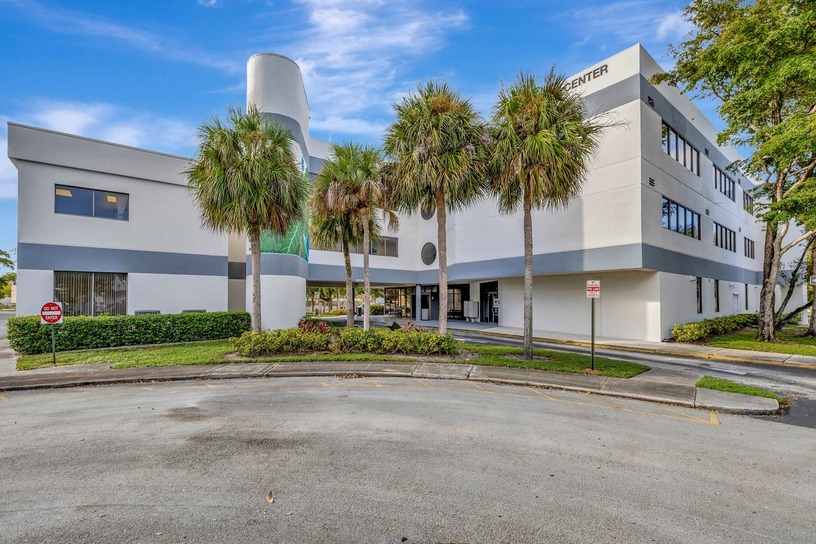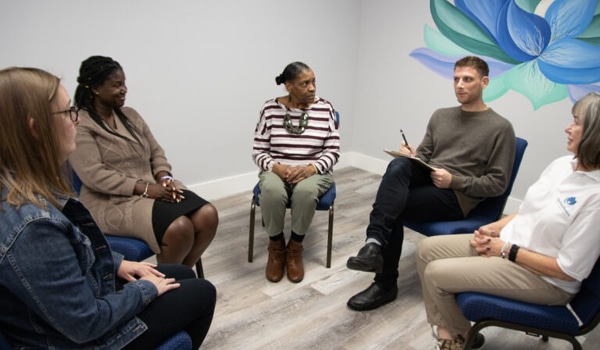If you’re one of 21 million Americans experiencing symptoms of depression, you might be wondering how to pay for a depression mental health program. The Sylvia Brafman Mental Health Center offers specialized depression assessments and treatment options for adults. Our housing options facilitate a convenient and smooth transition for out-of-state clients. Keep reading to learn more.

How to Pay for Depression Therapy and Treatment Mental Health Programs in South Florida
Learning About Clinical Depression
Clinical depression, also known as Major Depressive Disorder (MDD), is more than just feeling sad or going through a rough patch. It’s a common, serious mental health condition that affects one’s mood, thoughts, and daily activities. Persistent sadness, loss of interest in activities you once enjoyed, changes in appetite or sleep patterns, and difficulty concentrating may indicate MDD.
Depression can render the simplest of tasks overwhelming. Understanding depression means acknowledging that it’s not a sign of weakness or something you can “snap out of.” Causes of depression include genetic, biological, environmental, and psychological factors. If you think you or someone you love might be dealing with clinical depression, reach out for help, as early intervention can make a significant difference. Talk to a healthcare professional who can diagnose properly and discuss your options for managing depression. Remember, you’re not alone—many people experience depression, and with the proper depression treatment and support, overcoming and coping with depression is possible.

Depression Mental Health Therapy Program in South Florida That Offers Payment Options
Affordable mental health treatment is a phone call away—call us below. Finding the right mental health program in South Florida that offers alternative financing for therapy, such as therapy payment plans, can make a significant difference. For comprehensive mental health support, consider exploring the adult depression services at The Sylvia Brafman Mental Health Center near Fort Lauderdale.
Funding mental health treatment shouldn’t hinder you from accessing the necessary care. Our patient advocates are here to help you figure out how to pay for a depression program in South Florida. Call or visit us at your earliest convenience.
- The Sylvia Brafman Mental Health Center: 7710 NW 71ST CT, Tamarac, Florida, 33321

At The Sylvia Brafman Mental Health Treatment Center in Fort Lauderdale, Florida, our dedicated team of professionals is ready to guide you. We offer a variety of therapy programs and depression treatments, each uniquely designed to meet your needs.
"*" indicates required fields

Does Health Insurance Pay for Mental Health Depression Therapy and Treatment Programs in South Florida?
Many insurance plans do provide coverage for depression therapy and treatment programs. Thanks to laws like the Mental Health Parity and Addiction Equity Act, insurers must offer mental health benefits comparable to physical health benefits. This means that your policy will likely cover a significant portion of therapy sessions, medications, and inpatient or outpatient treatment programs.
Regardless, reviewing your specific insurance plan to understand the coverage details is important. Policies can vary widely, and you might encounter differences in copayments, deductibles, or the number of covered therapy sessions. Contact your insurance provider or call 877-958-9212 for detailed mental health insurance coverage information.

How to Get Insurance to Pay for Depression Programs
Navigating insurance coverage for depression treatment programs can be challenging, but there are steps you can take to maximize your benefits. Start by thoroughly reviewing your insurance policy to understand what mental health services are covered. Contact us at 877-958-9212 for specific information about your plan’s mental health benefits, including any necessary referrals or pre-authorization requirements.
Once you clearly understand your coverage, work closely with your healthcare provider to ensure that all treatments and services are appropriately documented and submitted to your insurance company. Your provider can help by writing a detailed treatment plan that justifies the necessity of the services you need. Keep thorough records of all communications with your insurance company and healthcare providers. Advocating for yourself is critical to getting the coverage you need for depression treatment.

How to Pay for Depression Programs with No Health Insurance
When considering how to pay for mental health depression without health insurance, there are several strategies you can use to manage expenses. Begin by exploring community resources—many areas have clinics that offer mental health recovery on a budget. Organizations like the National Alliance on Mental Illness (NAMI) and Mental Health America (MHA) can help you find affordable local services.
Additionally, some universities with psychology programs offer low-cost therapy sessions provided by supervised students in training. You might also consider online therapy options, which can be more affordable than traditional in-person sessions. Look for therapists who offer payment plans, sliding scale fees, or reduced rates for those in financial need. Crowdfunding platforms like GoFundMe can be another avenue to raise funds for your treatment. Lastly, don’t overlook the potential support from friends and family—they may be able to help you cover some of the costs. Investing in your mental health is crucial, and resources are available to help you get the care you need, even without insurance.
How to Pay for Depression Medications with No Health Insurance
Paying for depression medications without health insurance can be challenging, but there are options to help manage the costs. Start by looking for generic versions of your prescribed medication, which are often significantly cheaper than brand-name drugs. You can also use discount programs and cards from organizations like GoodRx, providing substantial savings at many pharmacies.
Another option is to check if you qualify for Florida assistance programs specific to pharmaceuticals. These programs often provide medications at reduced costs or even for free to those in financial need. Some community health clinics and organizations offer non-profit therapy support through low-cost or sliding-scale fee structures. Don’t hesitate to ask your healthcare provider about any available resources—they may have suggestions tailored to your situation.
Is Depression Therapy Cheaper Than Medication?
When considering depression treatment costs, therapy and medication have associated expenses that vary widely and according to multiple factors. Medication might seem cheaper initially, especially with insurance coverage that includes prescription benefits. And therapy sessions can add up, especially when paying for treatment without insurance.
Despite the costs, participating in psychotherapy is highly beneficial, whether or not you take medication, and research suggests you will increase your chances of finding relief by combining medication with depression therapy. Therapy can provide the tools and strategies for managing and overcoming depression, addressing underlying issues, and improving your overall mental health in ways that medication alone cannot. Don’t allow costs to deter you from seeking treatment—many therapists and treatment centers are willing to work with you to determine alternative ways to cover rehab costs, such as sliding scale fees based on your ability to pay. There are also community resources and depression support groups available. Investing in your mental health is invaluable and can lead to a more fulfilling, balanced life.
Ways to Pay for Depression Therapy if You Don’t Have Health Insurance
There are multiple avenues to access affordable mental health support, and exploring the options below can help you find depression therapy that meets your needs while accommodating your budget constraints. Remember, investing in your mental health is essential, and there are ways to pay for and access depression therapy without insurance. Call 877-958-9212 for professional guidance.

How Much Does Depression Mental Health Therapy and Treatment Cost Without Health Insurance Support?
The cost of depression mental health therapy and treatment without insurance can vary widely, depending on the type of services, the provider’s location and expertise, and many more factors. Therapy sessions average from $100 to $200 per hour, with prices potentially higher in urban areas or for highly specialized therapists.
For more intensive treatment options, such as residential programs, costs can escalate significantly, ranging from $10,000 to $60,000 for a month-long stay. In addition to psychotherapy, depression medications can add up, especially if you require brand-name drugs. Generic versions are typically more affordable, but monthly expenses can range from $10 to $100 or more. It’s crucial to factor in these potential costs when planning your treatment. Despite the costs, investing in your mental health can be vital, and exploring depression treatment options and other ways to cover rehab costs can help make treatment accessible.
How to Lower the Cost of Your Depression Treatment
To lower depression treatment costs while managing your condition, discuss flexible payment plans or sliding scale fees with your healthcare provider. Switching to generic medications can significantly reduce expenses without compromising their efficacy. It’s also worth looking into pharmacies that offer discount programs or price matching, further lowering medication costs.
Additionally, treatment centers like Sylvia Brafman, which offer free assessments, should be considered. For personalized guidance on managing your depression treatment needs, call 877-958-9212. Our patient advocates can schedule your free mental health assessment and provide valuable support and information tailored to your unique situation.
How to Get into a Depression Therapy Program in Florida
Getting into a depression therapy program in Florida can be a crucial step toward improving your mental health and overall well-being. The process may seem daunting, but you can find a suitable program with the right guidance. The method may vary from one program to the next, but we’ve provided a general step-by-step guide for you to refer to:

Paying For Depression Testing and Assessment in South Florida
The Sylvia Brafman Mental Health Center in South Florida provides complimentary assessments for individuals experiencing symptoms of depression. Our comprehensive depression testing and assessment aim to accurately evaluate your mental, behavioral, and emotional health status, tailoring a personalized treatment plan to meet your unique needs.
Calling 877-958-9212 demonstrates your commitment to achieving a healthier, more fulfilling life.


